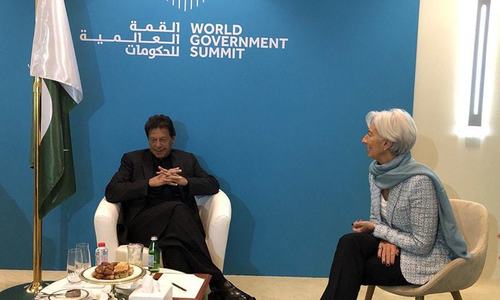FINANCE Minster Asad Umar expects to reach an agreement with the International Monetary Fund (IMF) on a three-year economic stabilisation programme by the end of this month. However, he says that the ongoing painful phase of reforms will last for two years and recovery will begin in the third year.
The latest edition of the South Asia Economic Focus report tends to support his view. Owing to tight monetary and fiscal policies, the report sees Pakistan’s economic growth at 3.4 per cent in FY19, slowing down to 2.7pc in FY20 and recovering at 4pc in FY21.
Leading local economists differ. Dr Ashfaque Hasan Khan estimates that the gross GDP will shrink by 15pc from $330 billion to $280bn. An independent observer says the recovery may take three years.
Such forecasts are however subject to revisions because of unpredictable variable factors. Forecasts differ from institution to institution.
Traversing the changing economic landscape over the last eight months, the daunting challenges facing the economy seem to be mounting rather than subsiding
Historical record shows that spurts of growth create macroeconomic imbalances for want of a sound development strategy. They are followed by stabilisation phases.
By avoiding the IMF bailout for this fiscal year, though not the Fund’s prior conditionalities, the PTI-led government is stretching the ‘painful reforms’ process to nearly four years to ‘avoid crash landing’ the economy.
Whether the extended stabilisation programme, with the same old prescriptions tried before, will shorten or prolong economic recovery remains an open question.
The finance minister says he is trying to address three chronic deficits—fiscal, current account and the savings and investment gap — to improve the fundamentals of the economy. If the government achieves growth with stability, it will be a remarkable feat.
Traversing the changing economic landscape over the last eight months, the daunting challenges facing the economy seem to be mounting rather than subsiding. The economy has landed in a stagflation: plummeting growth and ballooning inflation. CPI inflation was recorded at 9.41pc in the month of March.
As past record shows, the international stagflation witnessed in the early 1970s was followed by financialisation of the global economy. It led to de-industrialsation and spurred social exclusion. The people-centred development strategy initiated in that decade was nipped in the bud.
In Pakistan, the PTI’s public welfare agenda is stuck as the the current account and fiscal crises have become the government’s top priorities. Its fiscal and monetary incentives to improve earnings and savings and step-up investment have yet to bear fruit.
An economist, who is a member of the Economic Advisory Council, puts the current unemployment rate at 8pc. The inflation rate remained low as the economy grew moderately over the past half decade because exchange and interest rates were kept relatively stable.
Now the central bank is following suit. It has directed open market currency dealers to restrict their dollar sales to genuine buyers and the finance minister has appealed to investors not to buy and hoard the greenback. He reminded them of the State Bank’s recent observation that the exchange rate has reached equilibrium.
Despite a reduction in the current account deficit, and with total foreign exchange reserves at over $17bn as recorded on March 29, the State Bank was forced to intervene in the currency market to curb speculative trading.
Independent fiscal experts estimate that the government will seek $12bn from the IMF to shore its balance of payments position. It has already borrowed well over $11bn so far. Debts are piling up at faster than ever.
Another discouraging feature is that exports fell 4.54pc in March after a marginal increase in February. However, the trade deficit dropped to $23.45bn in nine months of the current fiscal year from $27.29bn during the same period last year.
The Pakistan Business Council says premature de-industrialisation has led to a reduction in share of exports in GDP. The Council believes that manufacturing needs to have a share of 29-30pc in GDP before its contribution to the economy starts to decline.
The government has yet to set up special industrial zones and offer necessary incentives to spur investment in manufacturing. Managing incentives and providing utility services to these zones will not be easy for the cash-strapped government.
As a result of faltering growth in revenue and surging cost overruns in non-development expenditure, the fiscal deficit for FY19 is estimated to increase by 6.3pc to hit a projected all time high amount of Rs2.39 trillion.
Raising tax revenues in a depressed market will be a Herculean task. In the first nine months of the current fiscal year, total tax revenue grew nominally by a mere 2.6pc with significant contribution coming from customs duty following devaluation.
Incidentally there is very little room to benefit from global financial markets as indicated by stagnant exports and declining foreign direct investment from traditional sources.
Aware of the emerging global trends the incumbent government is trying hard to strengthen economic and trade relationship with friendly regional economic power houses — China, Saudi Arabia, UAE, Turkey and Malaysia. However, enjoying strong traditional ties with the advanced West, adjustments will not be very easy, either for the government or the economy.
Published in Dawn, The Business and Finance Weekly, April 15th, 2019














































